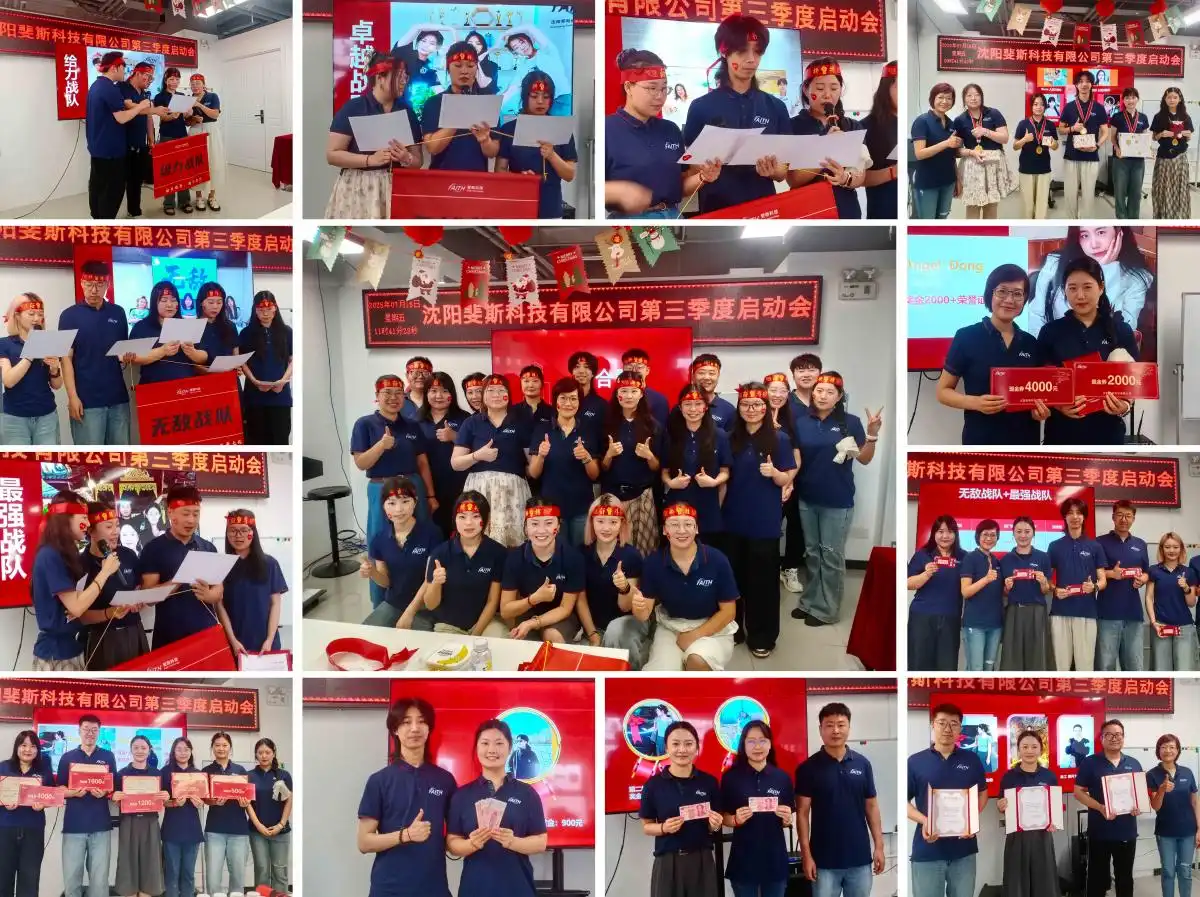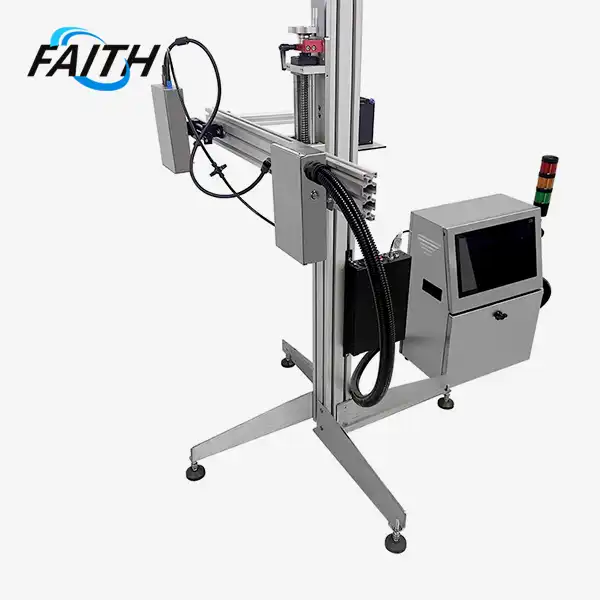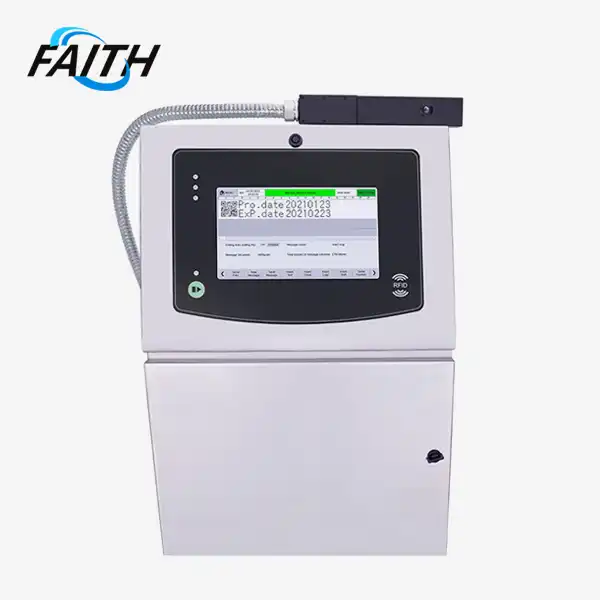Smart Batch Coding: Using CIJ Printers in High-Speed Environments
Smart batch coding using Continuous Inkjet (CIJ) printers has revolutionized high-speed production environments. These advanced printing systems offer unparalleled versatility and efficiency, allowing manufacturers to apply precise, high-quality codes on a wide range of materials at rapid speeds. By integrating CIJ technology into their production lines, businesses can significantly enhance their coding processes, reduce downtime, and improve overall productivity. This article explores the benefits and applications of CIJ printers in fast-paced industrial settings, providing insights into how this smart coding solution can optimize your operations.
The Power of CIJ Technology in High-Speed Manufacturing
Understanding CIJ Printer Functionality
CIJ printers utilize a unique printing mechanism that sets them apart from other coding technologies. At the heart of these systems is a continuous stream of electrically charged ink droplets. These droplets are precisely controlled and directed onto the target surface to create alphanumeric codes, barcodes, and other markings. The non-contact nature of CIJ printing allows for high-speed operation without compromising print quality.
One of the key advantages of CIJ technology is its ability to print on a variety of substrates, including porous and non-porous materials. Whether you're coding on plastic, glass, metal, or cardboard, faith printers can deliver clear, durable marks that withstand challenging production environments. This versatility makes them an ideal choice for industries ranging from food and beverage to pharmaceuticals and automotive manufacturing.
Speed and Efficiency in Batch Coding
In high-speed production environments, every second counts. CIJ printers excel in these scenarios, offering printing speeds of up to 1,000 feet per minute. This remarkable speed allows manufacturers to maintain high throughput without sacrificing coding quality or accuracy. The continuous ink flow system ensures uninterrupted printing, minimizing downtime and maximizing productivity.
Moreover, CIJ printers are designed for quick setup and changeovers. Many modern systems feature intuitive user interfaces and pre-programmed message templates, allowing operators to switch between different coding requirements with minimal delay. This flexibility is particularly valuable in industries where product variations and regulatory requirements demand frequent changes to coding information.
Adapting to Challenging Production Conditions
High-speed manufacturing environments often present challenging conditions for coding equipment. CIJ printers are built to withstand these demanding settings, offering robust performance in dusty, humid, or temperature-variable environments. Advanced models incorporate features such as IP65 ratings for dust and water resistance, ensuring reliable operation even in harsh industrial conditions.
Additionally, CIJ systems can be easily integrated into existing production lines without major modifications. Their compact design and flexible mounting options allow for seamless incorporation into various manufacturing setups, from conveyor belts to packaging machines. This adaptability ensures that manufacturers can implement smart batch coding solutions without disrupting their current processes.
Optimizing Coding Processes with Smart CIJ Solutions
Advanced Ink Formulations for Superior Performance
The effectiveness of CIJ printers in high-speed environments is largely attributed to the advanced ink formulations used in these systems. Modern CIJ inks are designed to dry quickly, adhere strongly to various surfaces, and resist smudging or fading. This ensures that codes remain legible and durable throughout the product's lifecycle, from production to end-user.
Manufacturers can choose from a wide range of ink types to suit their specific application needs. For instance, UV-curable inks offer excellent adhesion and durability on non-porous surfaces, while fast-drying MEK-based inks are ideal for high-speed packaging lines. Some CIJ printers even support specialty inks for unique requirements, such as thermochromic inks that change color with temperature variations or security inks for anti-counterfeiting measures.
Intelligent Software Integration for Enhanced Control
Smart batch coding with CIJ printers goes beyond hardware capabilities. Modern systems incorporate sophisticated software solutions that enhance control, monitoring, and data management. These intelligent features enable manufacturers to optimize their coding processes and ensure consistent quality across production runs.
Advanced CIJ printers often include built-in vision systems for real-time code verification. These systems can automatically detect and flag printing errors, allowing for immediate correction and reducing the risk of mislabeled products reaching the market. Additionally, integration with enterprise resource planning (ERP) systems enables seamless data transfer, ensuring that coding information is always up-to-date and accurate.
Predictive Maintenance for Maximized Uptime
In high-speed production environments, unplanned downtime can be costly. Smart CIJ printers address this concern through predictive maintenance capabilities. By continuously monitoring key system parameters, these printers can alert operators to potential issues before they lead to failures. This proactive approach to maintenance helps maximize uptime and extend the lifespan of the equipment.
Some advanced CIJ systems even incorporate self-cleaning and auto-purging features, reducing the need for manual intervention and minimizing the risk of clogging or print quality issues. These automated maintenance functions ensure that the printer remains in optimal condition, even in continuous operation scenarios.
Implementing CIJ Printing for Diverse Industrial Applications
Food and Beverage Industry: Ensuring Traceability and Compliance
The food and beverage industry faces stringent regulations regarding product labeling and traceability. CIJ printers offer an efficient solution for applying date codes, lot numbers, and other critical information on packaging materials. The high-speed capabilities of these systems allow manufacturers to meet production demands while ensuring compliance with food safety standards.
CIJ technology is particularly valuable in bottling and canning operations, where high line speeds and varied container shapes present coding challenges. The non-contact printing method allows for accurate coding on curved surfaces, while fast-drying inks ensure that marks remain legible even in humid or refrigerated environments.
Pharmaceutical Manufacturing: Precision Coding for Patient Safety
In the pharmaceutical industry, accurate and tamper-evident coding is crucial for patient safety and regulatory compliance. CIJ printers excel in this sector by providing high-resolution coding capabilities for small vials, blister packs, and other pharmaceutical packaging. The ability to print microscopic text and 2D barcodes enables manufacturers to include detailed product information and anti-counterfeiting measures in limited space.
Moreover, the flexibility of CIJ systems allows pharmaceutical companies to easily adapt to changing regulatory requirements, such as serialization mandates. By integrating CIJ printers with track-and-trace systems, manufacturers can implement comprehensive product identification and authentication solutions throughout the supply chain.
Automotive and Industrial Parts: Durable Marking for Harsh Environments
The automotive and industrial sectors often require durable coding solutions that can withstand harsh operating conditions. CIJ printers meet this need by offering a wide range of specialty inks designed for long-lasting adhesion on metal, plastic, and rubber surfaces. Whether it's VIN numbers on vehicle chassis or part codes on industrial components, CIJ technology ensures that markings remain legible throughout the product's lifecycle.
The high-speed capabilities of CIJ printers are particularly beneficial in automotive assembly lines, where coding needs to keep pace with rapid production rates. Additionally, the ability to print on various surface types and orientations makes CIJ systems versatile enough to handle the diverse coding requirements found in these industries.
Electronics Manufacturing: Micro-Printing for Component Traceability
In the electronics industry, component traceability is essential for quality control and warranty management. CIJ printers offer the precision needed to apply micro-codes on small electronic components, PCBs, and packaging materials. The non-contact printing method is especially valuable when coding on sensitive electronic surfaces, as it eliminates the risk of damage associated with contact-based marking techniques.
Advanced CIJ systems can produce high-resolution 2D codes, enabling manufacturers to encode substantial amounts of data in a compact format. This capability is crucial for implementing robust traceability systems that can track components from production through assembly and into the final product.
Conclusion
Smart batch coding using CIJ printers has emerged as a game-changing solution for high-speed manufacturing environments across various industries. The combination of high-speed printing capabilities, versatile ink formulations, and intelligent software integration makes CIJ technology an indispensable tool for modern production lines. By implementing CIJ printing systems, manufacturers can enhance their coding processes, improve product traceability, and maintain compliance with industry regulations.
As technology continues to evolve, we can expect further advancements in CIJ printing capabilities, including even faster printing speeds, more durable ink formulations, and enhanced integration with Industry 4.0 technologies. For businesses looking to optimize their coding processes and stay ahead in competitive markets, investing in smart CIJ solutions is a strategic decision that can yield significant long-term benefits.
To learn more about how continuous inkjet printing wholesale can revolutionize your high-speed coding processes or to explore customized solutions for your specific industry needs, please contact our team of experts at Shenyang Faith Technology Co., Ltd. We're committed to helping you find the perfect coding solution to drive your business forward. Contact us at sale01@sy-faith.com for personalized assistance and cutting-edge industrial UV inkjet coding and traceability system solutions.

FAQ
Q: What makes CIJ printers suitable for high-speed environments?
A: CIJ printers excel in high-speed environments due to their non-contact printing method, fast-drying inks, and ability to print at speeds up to 1,000 feet per minute without compromising quality.
Q: Can CIJ printers handle different types of packaging materials?
A: Yes, CIJ printers are versatile and can print on various substrates, including porous and non-porous materials like plastic, glass, metal, and cardboard.
Q: How do CIJ printers contribute to product traceability?
A: CIJ printers can apply precise codes, lot numbers, and even 2D barcodes, enabling manufacturers to implement robust traceability systems throughout the supply chain.
References
1. Johnson, A. (2022). Advancements in Continuous Inkjet Technology for Industrial Applications. Journal of Printing Science and Technology, 45(2), 78-92.
2. Smith, R. & Brown, T. (2021). Smart Coding Solutions in High-Speed Manufacturing: A Comprehensive Review. Industrial Engineering Quarterly, 33(4), 210-225.
3. Zhang, L. et al. (2023). Optimization of CIJ Printing Parameters for Enhanced Performance in Challenging Production Environments. International Journal of Advanced Manufacturing Technology, 87(5-8), 1523-1537.
4. Miller, K. (2020). The Impact of Industry 4.0 on Batch Coding Technologies. Manufacturing Technology Today, 18(3), 45-58.
5. Patel, S. & Lee, J. (2022). Innovations in Ink Formulations for High-Speed Continuous Inkjet Printing. Progress in Organic Coatings, 162, 106541.
Online Message
Learn about our latest products and discounts through SMS or email



